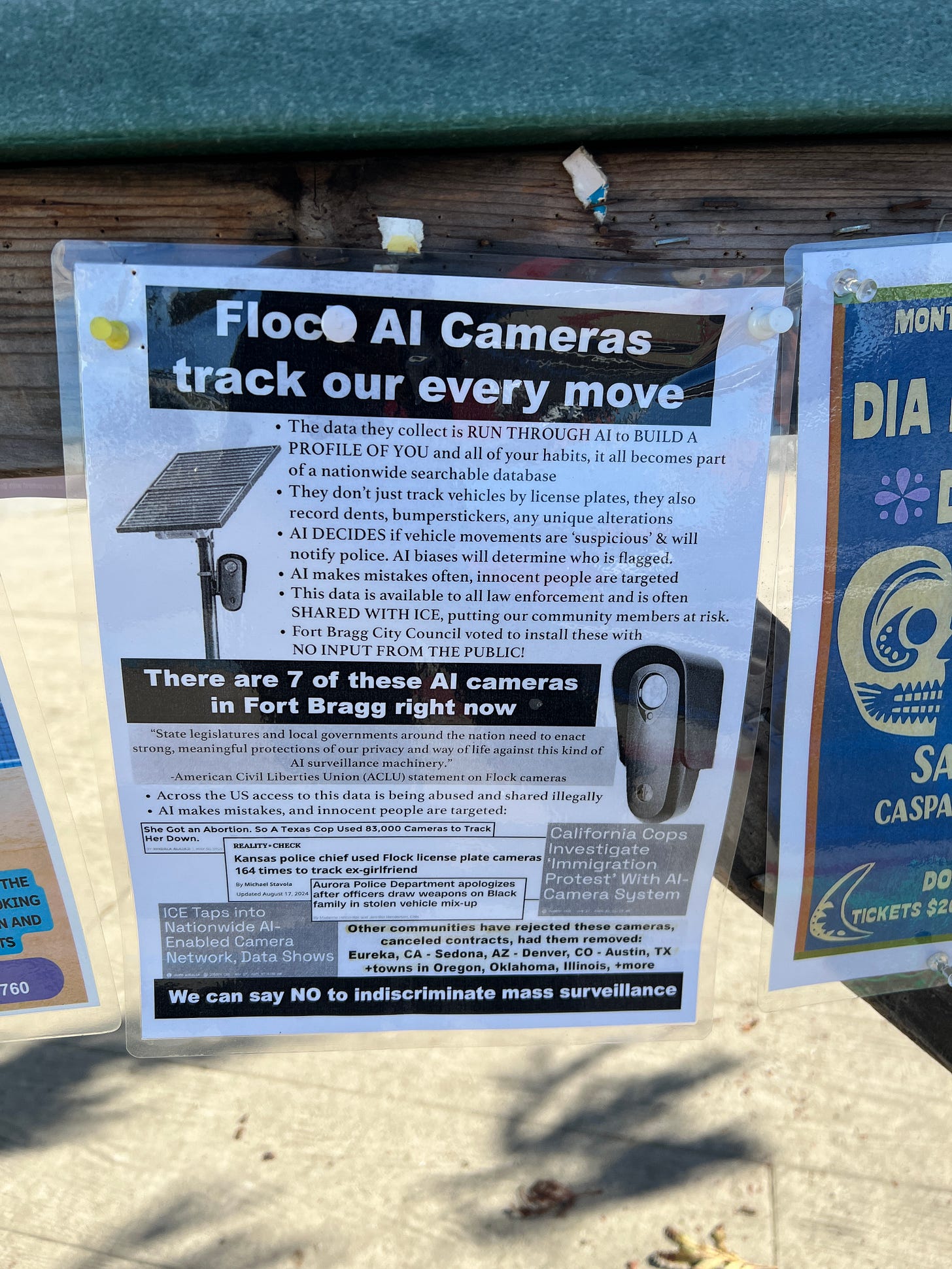Fort Bragg Residents Alarmed by “Flock AI Cameras” Posters
Police Chief says system targets vehicles tied to crimes, not people
Summary: Posters claiming “Flock AI Cameras Track Your Every Move” have appeared around Fort Bragg, sparking public concern over the city’s use of automated license plate readers. Police Chief Eric Swift says the seven Flock cameras installed in the city are used only to identify vehicles connected to crimes and that the data is deleted after 30 days.
Posters with the headline “Flock AI Cameras Track Your Every Move” are plastered around Fort Bragg, prompting alarmed residents to contact the Fort Bragg Police Department for information about the city’s use of automated license plate readers.
Interim Police Chief Eric Swift confirmed that the city has installed seven Flock cameras, but he said they are not typical surveillance devices.
“The Flock cameras we have are specifically tied to a crime — so it’s tied to the vehicle itself or the description of the vehicle,” he said. “The cameras are not just taking pictures or videos of people.”
According to Flock Safety, the company that sells the cameras, the system automatically captures license plates of passing vehicles, along with other unique characteristics such as color, make, model, and even bumper stickers or visible damage. This data is compared to police “hot sheets” — lists of vehicles that have been reported stolen or are wanted in connection with a crime. When a match is found, the system alerts local law enforcement.
Swift clarified that the data is owned by the city and deleted after 30 days.
“It’s illegal for us to share that data with the federal government or other federal agencies or out of state,” Swift said.
Swift also promised to address concerns about transparency raised in a recent Mendocino Coast News article that highlighted the absence of a promised data portal allowing the public to verify how the cameras are being used.
Councilmember Lindy Peters noted that the cameras will not be used by ICE and said he hoped Swift’s explanation would help alleviate anxiety that has been expressed, particularly on the MCN listserv. He described the cameras as a tool in the city’s “public safety tool belt” that helps keep citizens safe and their vehicles in their driveways.
Peters also noted that the cameras were acquired using asset forfeiture funds and grant funding, not general fund money. Asset forfeiture funds are money and property seized by law enforcement and forfeited through civil or criminal proceedings. Their use is restricted by law: they cannot be used to supplant routine agency budgets or replace general operating expenses, but they can support task forces or joint operations.
Statewide ALPR Misuse Fuels Local Fears
Community concerns about ALPR privacy are exacerbated by ongoing reports of data misuse and illegal sharing throughout California.
As reported by CalMatters, agencies across Southern California — including the Los Angeles Police Department and sheriff’s departments in San Diego and Orange counties — violated state law more than 100 times in a single month in 2025 by sharing license plate reader data with federal agents, including ICE and Customs and Border Protection (CBP).
Subsequent investigations by Palo Alto Online and the San Francisco Standard found that police departments in Atherton, Menlo Park, and San Francisco also violated state law.
The Lost Coast Outpost recently reported that the Humboldt County Sheriff’s Office appears to be routinely violating its own policy and state law by allowing outside agencies access to its ALPR data, often without obtaining legally required information such as the reason for the search or the identity of the officer conducting it.
Attorney General Rob Bonta sued the city of El Cajon earlier this month for violating SB 34 and sharing license plate data with federal and out-of-state entities. The suit was filed two days after Gov. Gavin Newsom vetoed SB 274, which would have imposed additional restrictions on data collected by automated license plate readers — specifically, a default 60-day data deletion requirement.
Newsom said the bill did not strike the right balance between protecting individual privacy and ensuring public safety, and that it created enforcement costs not accounted for in the current budget.




The police claim they own the data. Where do they store the data? On a local server? They in fact do not own the data. Flock keeps all the data, and sells the police access to the data, and the police access to the data only lasts 30 days. When our police say they own the data, and it is only available for 30 days, what they are saying is that they went into the flock app and clicked some boxes in the privacy settings.
Flock has been caught in multiple lies, both in general statements and in faulty contracts they make with local cities. They then turn around and sell the data to the highest bidder like Home Depot, Lowes, Palantir, ATF, ICE, and deep state security and marketing data brokers we have never heard of. It just gets worst and worst the more you look into it.
ICE has also been seen to access direct flock feeds in areas where ICE's access was banned, using a list serv to make requests from local buddy cops.
Do we really trust the IT security skills of our police officers over this kind of power? A half assed fishing scam will end up with everybodys houses getting robbed when they head over highway 20.
Communities have been successfully fighting back against this all over the U.S., and Fort Bragg is next!
Give law enforcement an opportunity to become criminal and they will take it
92% of the time. The other 8% will prosecute whistleblowers!
Lindy Peters likes the cameras, he likes rubber soccer fields too !
Why do we put up with this local bureaucracy? Because no one wants to be a bureaucrat among small thinkers when it’s” a nice day in the neighborhood !”